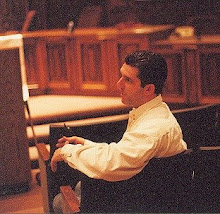@PaulRevere: The what are coming? Is this really you?
Over at #PDF09 (it's a new-media conference), there's lots of hoo-hawing over how world-altering Twitter and other social media are. I agree with all of this, but I have a caveat and a caution.
Caveat: the more possible sources of information, the more face-to-face contact will matter.
Caution: do not confuse your Facebook friends and your Twitter followers with people that will help you when it matters.
See what I mean?
Alec Ross said at PDF09 that Paul Revere would simply have tweeted instead of having to ride. Maybe he's right. But the genius of Revere was not that he communicated, but that the people in so many villages and towns knew him and trusted what he said. And let's not minimize this, either - a tweet is great, but a real man on a real horse riding through your town is a lot more attention-getting, and a lot more mobilizing. Revere wasn't interested in people knowing that the regulars were out, he was interested in people acting on that knowledge.
More timely: Iranians were tweeting and Facebooking and YouTubing like crazy, but the potential for revolution was only made real when they marched.
I believe that we're pushing over a very real threshold here with Twitter and other tools of social media. In most ways, I'm not really qualified to talk about this. I'm a mortgage guy, for Heaven's sake, not a consultant with Radian 6. What I know about Twitter and Facebook and FriendFeed and all that is just what I've observed myself and learned from an admittedly limited experience.
But in another way, I'm well placed for observing the effects of these things. I live in a small town, my office is less than a mile (2 stop signs) away from my home, and my life is interwoven with many of the little businesses that line Main Street. I know people that are well-versed in social media but not integrated into the place they actually live, and others that are ignorant of SM, but who have a vibrant place in the local community. I see the relative power of those personal, physical connections every single day, and with all due respect to Alec Ross, who is a much smarter guy than I am, I think that Paul Revere might still have chosen to ride.
This has lots of business and personal implications. My business is already ephemeral - nobody ever sees any of the money that changes hands in a mortgage transaction - and the electronic media I use for communication can only do so much to advance the relationships that I depend on for referrals. It's certainly easier for people to tweet me or email me a referral, but I've found that it's more likely that they'll give me one on the phone or in person. I become the product my company sells, and raving fans rave more often in the physical presence of the thing they're raving about.
As previously stated, I love Twitter and I'm an evangelist for social media. I think it is immensely powerful. But I do think we're running the risk now of having the engine revving at incredibly high speeds, but the clutch is engaged and the car is not moving. There are scads of information out there, more than ever before, coming at us at an impossible rate, yet our lives, the things we are and do, remain bounded by the same 24 hours and the same willingness - or unwillingness - to act.





